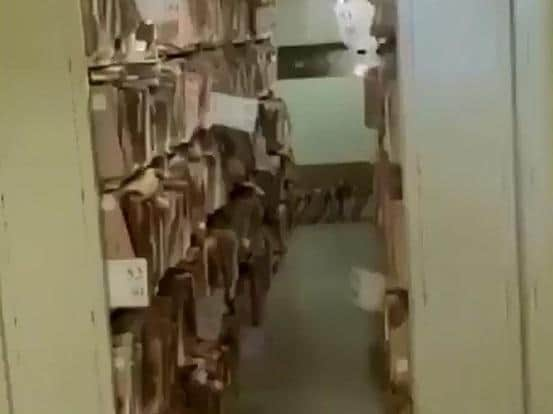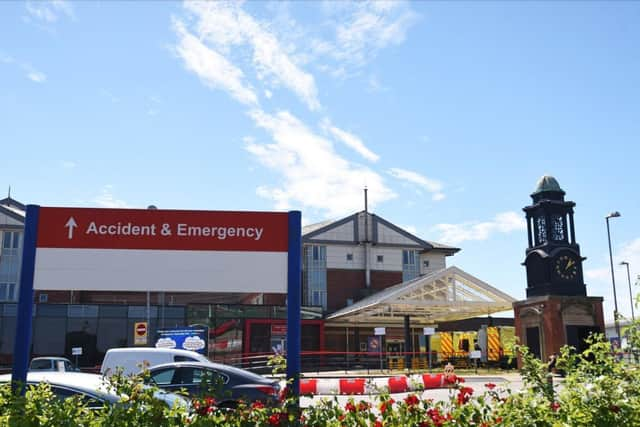Blackpool Victoria Hospital to use old Parkwood unit to store medical records ahead of £5 million digitisation programme
and live on Freeview channel 276
Bosses will use the ground floor of its unused Parkwood unit, which once housed a mental health inpatient unit, to store the documents.
Health bosses are spending £5 million so paperwork can be viewed on a computer in what has been called a "major technological transformation".
Advertisement
Hide AdAdvertisement
Hide AdWorkers are being brought in to staff a new 'scanning bureau', where industrial-scale machines will be used to convert piles of patient records.


The move comes after a Gazette investigation told how missing and "illegible" records hampered the probes into five patient deaths at the Vic.
Kevin McGee, the chief executive of Blackpool Teaching Hospitals NHS Foundation Trust, said earlier this year: “The trust has agreed a phased Electronic Patient Record (EPR) implementation strategy which will upgrade and restructure the current health record storage system.
“This strategy includes an electronic document management system (EDMS) which will digitally store and track patient health records.
Advertisement
Hide AdAdvertisement
Hide Ad“This will improve clinical effectiveness, reduce operational costs, ensure compliance with CQC guidance about records and data management and most importantly boost patient safety and care as it will improve the ability of clinical staff to make decisions based on comprehensive patient history available when the patient arrives at hospital.


“Digitalisation will also mean records will be available concurrently at multiple locations therefore improving the availability of records and accuracy of information accessible quickly to clinicians.’’
The town's coroner Alan Wilson and assistant coroner Tim Holloway wrote to bosses at the Whinney Heys Road hospital to voice their worry that poor paperwork could even lead to more deaths.
The trust said last year it "would like to apologise for the identified issues" and promised bosses were working on a fix - namely the new record-keeping system.
Advertisement
Hide AdAdvertisement
Hide Ad"The trust currently has an electronic patient record in its emergency department and is finalising plans to deploy this solution to the rest of the organisation," it added.


A year earlier, Vic bosses promised patient records were not at risk of being lost, after a video emerged of thousands of files stored in an old operating theatre.
The footage, posted on social media and shared with The Gazette, showed racks of files stacked up. While most of it appeared in order, the clip showed some files lined up on the floor, next to theatre taps and in boxes behind doors, sparking potential health and fire safety fire issues.
Tim Bennett, the trust's deputy chief executive and finance boss, said at the time that there were more than 450,000 sets of patient notes, plus 400,000 appointments held every year.
Advertisement
Hide AdAdvertisement
Hide Ad"This means that many thousands of patient notes are moved every week, with staff retrieving and re-filing them as needed to support patient care.
"We can assure our patients that notes are held in a safe and secure environment and in an order which allows them to be easily found and distributed where and when needed around the trust sites."
The inquest, held to look into the exact circumstances of her death, heard how an expert tasked with carrying out an internal review at the Vic was faced with "at times poor and illegible" paper records, while both the review and the inquest were delayed because "clinical records could not be located for some time".
Mr Wilson said: "Other investigations have been affected by similar issues: a further investigation into the death of [a patient named only as] JS ultimately proceeded in the absence of hospital records, which reportedly went missing after the death and could not be found."
Advertisement
Hide AdAdvertisement
Hide AdMr Wilson said he wrote to the hospital three years ago after an inquest was carried out into the death of patient ‘WB’ “in the absence of documentations which the trust was unable to locate”.
Months earlier, the court received a review into the death of patient ‘NM’ “which had been completed in the absence of some of the hospital records, which could not be located.”
Mr Wilson said he did not believe the “quality of the records or the delay in them being located” contributed to Mrs Tate’s death, but warned: “Unless this type of issue is not addressed then risks will occur as a consequence.
“Medical professionals who take over the care of patients from other staff at handover need to be able to familiarise themselves with accessible and legible records.
Advertisement
Hide AdAdvertisement
Hide Ad“When this does not happen the quality of care received by patients can be affected. It seems to me that issues persist as regards the quality of record keeping within the trust and that it would be remiss of me not to raise that concern at this time.”
And Mr Holloway highlighted his own concerns after the inquest into the death of James Fletcher, who was born in Blackpool in October 1990 and lived in a home in Larbreck Avenue, Elswick.
He said "complete records were not provided to the court" despite orders given before the inquest, and said: "It was understood from the trust that complete records were unavailable and yet it transpired on the first day of the inquest that further records were available but had not been found and produced previously.
"I am concerned that the system of record-keeping gives rise to a risk that patients' records, which are material to their ongoing care, will be lost of otherwise inaccessible."
Advertisement
Hide AdAdvertisement
Hide AdThe former Health Secretary Jeremy Hunt set the challenge for the NHS to be paperless by 2018.
It is thanks to our loyal readers that we can continue to provide the trusted news, analysis and insight that matters to you. For unlimited access to our unrivalled local reporting, you can take out a subscription here and help support the work of our dedicated team of reporters.
Comment Guidelines
National World encourages reader discussion on our stories. User feedback, insights and back-and-forth exchanges add a rich layer of context to reporting. Please review our Community Guidelines before commenting.